Preface So youve decided to learn Korean! I congratulate you on your decision, and welcome you on your new journey. As for me, I first learned Korean while living in Korea in 2005.
Upon returning home, I chose to major in Korean at my university in 2008, and its been nonstop fun ever since. Im happy with my decision to pursue Korean education as a career, and hope to be able to help many others see their Korean abilities improve as we study this wonderful language together here in this book.  What to Expect This book was designed with you, the learner, in mind. As such, Im assuming that you have never studied Korean before, and will begin teaching from the very basic of basics, working our way up from there. First time language learners, Korean beginners, and curious minds of all ages yes, even those of you who may think "Im too old to learn a language" were in my thoughts while writing this book. This book was designed specifically for you.
What to Expect This book was designed with you, the learner, in mind. As such, Im assuming that you have never studied Korean before, and will begin teaching from the very basic of basics, working our way up from there. First time language learners, Korean beginners, and curious minds of all ages yes, even those of you who may think "Im too old to learn a language" were in my thoughts while writing this book. This book was designed specifically for you.
If youve already studied some Korean before, thats great! Dont worry. I have you in mind as well. In addition to covering the basics, I always make sure to add in a little more in each chapter. Through my personal and academic studies of the Korean language, Im finding the majority of resources out there for teaching Korean often fail to present concepts in their correct forms to put it simply, I find lots of mistakes in Korean being taught in other textbooks and on web sites. As such, its likely that youll learn something new through this book, even if youve already studied Korean before up to any level. "Advanced Notes" sprinkled throughout each chapter add information that beginning Korean courses might not teach at first, but are still important. "Advanced Notes" sprinkled throughout each chapter add information that beginning Korean courses might not teach at first, but are still important.
Sometimes these will even contain advanced-level material if I feel that its something that even beginners should know. "Culture Notes" will deepen your understanding of the Korean language, because you cant speak Korean well without knowing a thing or two about Korean culture. I didnt even know where Korea was on a map before I started studying the language (Note to self: North and South Korea are very different!). Do not expect to be speaking fluent Korean by the end of this book. There is simply too much that needs to be covered before you will be able to converse in Korean without any difficulties. And, you will be able to fill in the gaps that most Korean learners face later on in their studies. And, you will be able to fill in the gaps that most Korean learners face later on in their studies.
And Ill be there the whole way, holding your hand through each lesson figuratively, of course. Im not really going to hold your hand the whole time (Im sorry, but thats just creepy). How to Use This Book This book builds upon itself with each chapter. I recommend that you take your time going through each lesson, in order. Dont move on to the next section until you feel comfortable with the last one. Each lesson builds upon knowledge learned from the previous one, so skipping a lesson could lead to problems understanding concepts in later lessons; this negative result would obviously compound the more lessons you skip.
In short, do all of the lessons and all of the exercises in order, or at least do all of the lessons if youre in a rush and feel confident enough to skip the Practice sections. If this is your first time learning Korean, I recommend reading each "Culture Notes" section, but skipping the "Advanced Notes" sections, as these are not designed for first time learners. If this isnt your first time studying Korean, I recommend reading the additional "Advanced Notes" in each chapter. In addition, if youve already read this book once before, I would also recommend reading the "Advanced Notes" sections on your second time through. As you complete each chapter, refer frequently to the vocabulary lists in the back of the chapter, or the Glossary in the back of this book as necessary. If you are having trouble understanding a sentence, or creating a sentence for the Practice sections, it might only be due to not knowing the appropriate vocabulary word.
Take notes along the way as you complete each chapter. Practice reading, writing, and speaking as much as possible. If you have a friend who can speak Korean, practice speaking and listening frequently. In addition, if you notice a grammar form you are not familiar with, I would recommend proceeding through the book more slowly. This book builds upon itself, so if you have missed something, and if it does not appear in the chapter you are currently reading, it may have been skipped from a previous chapter. There is no need to rush through the basics of the Korean language.
It will take time to become familiar with using the Korean alphabet, and to become used to hearing the sounds of the language this is normal. Once you have learned the basics, it will become much easier, and faster, to move forward and acquire new concepts. Also make sure to download the free audio files for this book at gobillykorean.com. How to Study Korean Im not the authority on how your brain will learn this language the best, but I do have a few suggestions. Try some of them, and use what works for you. Quiz yourself frequently on words you are learning, or have somebody else quiz you.
Force yourself to create sentences using the words and grammar forms that you are learning. If you are fortunate enough to live in an area with many Koreans (such as in Korea, or a major city), make friends and practice speaking the language as much as possible. Keep a regular study schedule. Even if you only have 30 minutes a day, 5 days a week, stick to it. 30 minutes a day for 5 days is better than studying 150 minutes at once. Shorter, frequent study is also easier to manage if you have a busy schedule.
Write vocabulary words you learn on sticky notes, and place them over things and places that they correspond to. For example, you can write the Korean word for "pencil" on your favorite pencil, or the word for "friend" on your best friends forehead. Grammar is more important than vocabulary. A beginner with a strong understanding of basic Korean grammar will sound worlds better than a walking dictionary that cant construct a coherent sentence. Brush Up Your English Grammar. "This is a Korean book! Why do I have to learn English grammar?" Many concepts in Korean are much easier to explain and understand if you have a basic grasp of English grammar.



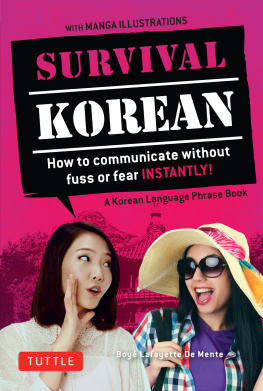

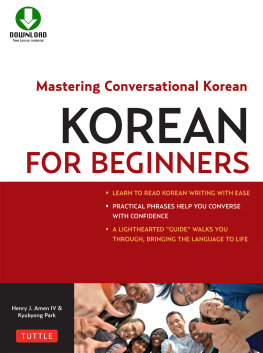


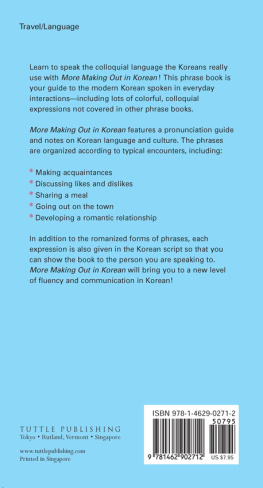
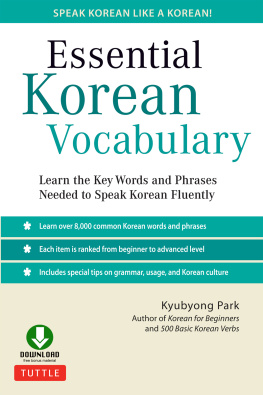
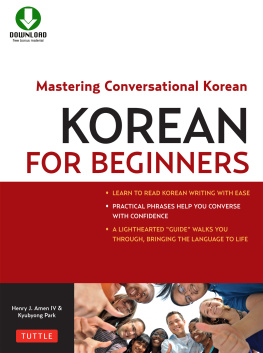


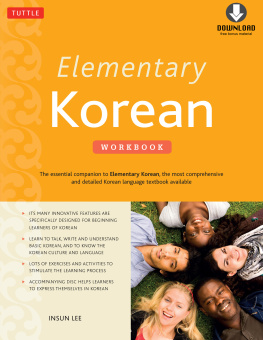
 Written by: Billy Go Edited by: Michelle Chong and Wooseok Lim Published by: GO! Billy Korean Audio files for this book are available for free download from gobillykorean.com. Cover and inside illustrations by: HeeJin Park (heejindraws.tumblr.com) Hangul letter blocks by: Sarah HaEun Jeong (esperes.weebly.com) Copyright 2014 GO! Billy Korean http://www.gobillykorean.com All rights reserved Smashwords Edition, License Notes This ebook is licensed for your personal enjoyment only. This ebook may not be re-sold or given away to other people. If you would like to share this book with another person, please purchase an additional copy for each recipient. If youre reading this book and did not purchase it, or it was not purchased for your use only, then please return to your favorite ebook retailer and purchase your own copy. Thank you for respecting the hard work of this author.
Written by: Billy Go Edited by: Michelle Chong and Wooseok Lim Published by: GO! Billy Korean Audio files for this book are available for free download from gobillykorean.com. Cover and inside illustrations by: HeeJin Park (heejindraws.tumblr.com) Hangul letter blocks by: Sarah HaEun Jeong (esperes.weebly.com) Copyright 2014 GO! Billy Korean http://www.gobillykorean.com All rights reserved Smashwords Edition, License Notes This ebook is licensed for your personal enjoyment only. This ebook may not be re-sold or given away to other people. If you would like to share this book with another person, please purchase an additional copy for each recipient. If youre reading this book and did not purchase it, or it was not purchased for your use only, then please return to your favorite ebook retailer and purchase your own copy. Thank you for respecting the hard work of this author. What to Expect This book was designed with you, the learner, in mind. As such, Im assuming that you have never studied Korean before, and will begin teaching from the very basic of basics, working our way up from there. First time language learners, Korean beginners, and curious minds of all ages yes, even those of you who may think "Im too old to learn a language" were in my thoughts while writing this book. This book was designed specifically for you.
What to Expect This book was designed with you, the learner, in mind. As such, Im assuming that you have never studied Korean before, and will begin teaching from the very basic of basics, working our way up from there. First time language learners, Korean beginners, and curious minds of all ages yes, even those of you who may think "Im too old to learn a language" were in my thoughts while writing this book. This book was designed specifically for you.